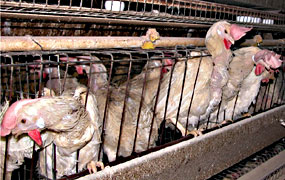
CLUCK CLUCK--Chickens crammed into cages is the type of picture Missouri legislators would like to see banned by law. The proposed legislation is just one of the many tainting the State's intellectual climate.
Missourians have a right to be upset by proposed legislation that would hinder their ability to determine what regulations of factory farms are necessary to maintain their quality of life.
Factory farms are notorious for their disruption of the lives of their neighbors. The stench of the manure stemming from the thousands of animals confined inside the warehouse walls is enough to make an otherwise beautiful day unbearable. Not only is this air pollution nauseating, it also causes asthma and other respiratory ailments for those living close enough to breathe in the fumes.
Water pollution is another environmental side effect of factory farms that nearby residents often have to deal with. Millions of fish have been poisoned in North Carolina alone due to nitrogen run-off from hog lots. And the Chesapeake Bay has suffered for the past decade due to the chicken industry in Maryland.
Article about HB 666, "If they don't like it, they'll pass a law"
Article, "The Cafo bill - legislation gone awry"
A story in the news recently was a profile of the village of Wieckowice, Poland. This small town was used as a new location for a factory farm sponsored by the American-based Smithfield Foods. For the residents of Wieckowice, nothing could have been worse for their children's lives.
The town was overwhelmed with the odor of animal manure. Their children were fainting and vomiting from the stench. The kids who swam in the local lake developed eye infections. One resident was quoted as stating, "At school, they still can't open the windows. During the warm weather, my daughter complains of dizziness."
Not only are factory farms harmful to their neighbors, they're also havens for some of the worst forms of animal abuse.
Egg-laying chickens are housed in cages too small for them even to spread their wings. They're packed so tightly together that each hen isallotted less than the size of a piece of paper to live out her entire life. These birds never engage in many of their natural activities suchas nesting, dust bathing, or even walking.
Broiler chickens (chickens raised for meat) are housed in massive, barren warehouses. They're genetically manipulated and given antibiotics to grow so quickly that they're full size after just 45 days. To put this in perspective, in the 1950s it took 84 days to reach the same weight. This rapid growth forced upon birds often causes heart and lung failure, along with crippling leg disorders.
It's clear that no family would want massive animal-production operations to come to their neighborhood. Whether it's to protect our children and the environment, or to oppose the overt abuse of animals, we should all work together against factory farms.






Comments